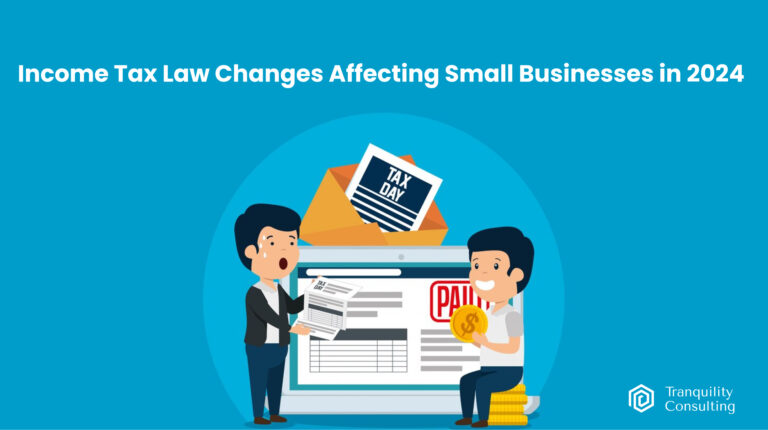2024 is a significant year for small businesses navigating the landscape of tax regulations. Income tax law changes is essential to ensure compliance and take advantage of the opportunities these changes may bring. In this blog, we’ll explore the small business tax changes for the year, focusing on the most impactful new tax regulations in 2024. We’ll also highlight business tax reform, amendments, deductions, credits, and compliance requirements that small businesses must be aware of.
Key 2024 Tax Updates for Small Businesses
As of 2024, several new tax regulations and amendments are poised to reshape small businesses’ tax obligations. These include adjustments in tax rates, eligibility criteria for deductions and credits, and new compliance requirements. The 2024 tax updates released by the IRS highlight inflation adjustments, modifications to the earned income tax credit (EITC), and changes to business tax credits 2024. These updates will impact how small businesses calculate their taxable income, claim deductions, and report earnings. The IRS continues to adjust thresholds and limits based on inflation, which influences businesses’ tax obligations.
Small Business Tax Changes: What You Need to Know
Small businesses must stay informed about the small business tax changes in effect in 2024. The following are some key areas that are likely to influence tax filing and reporting:
- Tax rate adjustments: Tax brackets and rates have been adjusted based on inflationary trends. These changes can affect small businesses with a pass-through tax structure or those filing as sole proprietors.
- Revised thresholds: Many small business deductions and credits now have revised income thresholds. For example, the deduction limits for Qualified Business Income (QBI) have changed, and it’s essential to understand if your business still qualifies for this deduction.
New Tax Regulations 2024: Implications for Small Businesses
Several new tax regulations in 2024 bring forward changes that can impact small business finances. Understanding how these tax law amendments affect deductions and allowable expenses is crucial for accurate tax planning in 2024. Some of the most notable amendments include:
- Depreciation deduction changes: Bonus depreciation rates, a critical deduction for small businesses, have been modified. Businesses must review how they depreciate assets purchased in 2024 and adjust their financial forecasts accordingly.
- Business meal deductions: The 50% deduction for business meals has been reinstated for 2024 after being temporarily increased to 100% in 2021-2022. Businesses must comply with this updated rule and have proper documentation to support these deductions.
Business Tax Reform
Recent business tax reform measures reflect the federal government’s intent to streamline tax processes while reducing loopholes and increasing compliance. Businesses should consult with tax professionals to determine how these tax compliance changes might impact their situation. These reforms affect several tax areas, including:
- Employee retention credit (ERC): While the ERC program was available in previous years, retroactive claims are concluded in the 2024 tax year. Small businesses that qualified for the ERC in 2020 or 2021 should ensure they’ve filed for these credits before the applicable deadlines.
- Research and Development (R&D) credit changes: In 2024, the qualification criteria for R&D credits were modified, allowing more businesses to claim these credits.
Small Business Deductions and Credits to Leverage
Staying compliant with tax laws while leveraging available deductions and credits is vital for small businesses. Small businesses must also stay informed about business tax credits 2024, as various sectors, such as clean energy and R&D, may be eligible for special credits. Here are some small business deductions and credits that can reduce your tax liability in 2024:
- Section 179 deductions: The threshold for Section 179, which allows businesses to deduct the cost of qualifying equipment and software, has been updated for inflation.
- Qualified Business Income Deduction (QBID): This deduction remains valuable for small business owners, although the eligibility limits have been revised.
- Health care tax credits: Small businesses offering health care plans to employees can continue to claim tax credits in 2024, with adjustments to the income thresholds.
Tax Law Amendments in 2024
The tax law amendments for 2024 provide significant updates across various tax provisions that affect small businesses. The IRS has introduced:
- Changes to the EITC: The Earned Income Tax Credit (EITC) tables have been updated for inflation. This can affect small business owners and employees who qualify for this credit. Understanding the updated limits is critical to ensure compliance and maximize this credit.
- Updated tax filing requirements: The IRS has implemented stricter requirements for reporting deductions and credits, ensuring businesses maintain transparency and comply with the latest tax regulations.
Ensuring Compliance: Understanding Tax Compliance Changes
With every tax reform and update, businesses must prioritize tax compliance changes to avoid costly mistakes. As part of the IRS updates 2024, the agency has streamlined reporting processes and introduced more automated tools to help businesses file taxes accurately. Small businesses must meet all reporting requirements, particularly regarding deductions and credits. The IRS continues to improve auditing mechanisms, so companies must stay vigilant about their financial reporting practices. Consulting with a tax advisor is highly recommended to navigate the tax policy updates and stay on the right side of the law.
Conclusion
The income tax law changes affecting small businesses in 2024 will bring new challenges and opportunities. Staying informed about 2024 tax updates, understanding how the small business tax changes impact your operations, and leveraging available deductions and credits are essential for small businesses in this dynamic tax landscape. Tax professionals can offer valuable insights and help businesses comply with new tax regulations in 2024 while minimizing their tax liabilities. Businesses that stay proactive and informed will be well-positioned to navigate the complexities of business tax reform and bloom in the year ahead.
FAQs
1. What are the critical tax updates for small businesses in 2024?
2024 brings tax rate adjustments, revised deduction thresholds, changes to depreciation rates, and new compliance requirements for small businesses.
2. How do the new tax regulations affect small businesses in 2024?
The new regulations impact depreciation, business meal deductions, and tax credits, requiring businesses to adjust their tax strategies accordingly.
3. What deductions can small businesses claim in 2024?
Small businesses can claim Section 179 deductions, Qualified Business Income deductions, and health care tax credits with updated income thresholds.
4. What changes were made to the Employee Retention Credit in 2024?
The ERC program has ended, but businesses that qualified in prior years should ensure they have filed retroactive claims before the deadlines.
5. How can Tranquility Consulting help small businesses comply with 2024 tax changes?
Tranquility Consulting offers expert tax advisory services to help small businesses navigate the latest tax regulations, ensure compliance, and maximize savings.
If you have any questions or need business-related tax consulting advice, please contact us at: [email protected]





